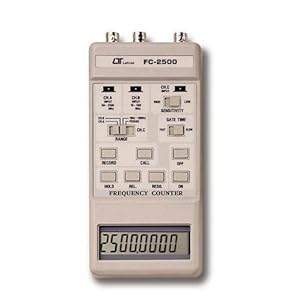A basic FC is one that provides highly accurate counting with error all under 5 ppm, but has few control over sensitivity or can make other measurements beyond period, which is simply 1/f. The top $1000+ models from Agilent do pulse width, duty cycle etc., but you should do those better with a scope rather than pay extra for those functions on an FC.
The Rigol 1052E comes with a decent FC built in, capable of measuring to the scope's bandwidth.
Handheld models have most basic functions but are easier to transport like a DMM, and if you stick an antenna on them, can test radio output. The LT Lutron, or RSR are current models sold that were once a rebadged B&K ~4ppm accuracy, from 1Hz to 2.5GHz. They sell between $150-250. I have one of these. A good one out of production was a Global Specialties model 3005, that is still sold as a Tenma brand. There is one at eBay new for just $100, normally $270 new.


A popular one on eBay is the Victor :

If you can find someone who will offer replacement warranty for damage, this Victor works very well and often are sold by US eBay sellers, so it helps if you get a dud! Its a 2.5GHz counter that typically sells for under $90. It has decent rating among Ham radio guys, major complaint is quality control.
http://www.eham.net/reviews/detail/7839Other than these, the usual brand names like B&K, Protek, Heathkit, Elenco etc., have old second hand benchtop models on eBay that will read to 100 MHz or nearby, for under $100. 100 MHz was typical for older circa FC, but the same amount of money or just slightly more will get you a new and more accurate one for >= 1 GHz, so I don't think old frequency counters are competitive today, considering many function generators throw in a multi-MHz frequency counter in for free.
THe $100 Hantek DDS FG 3x25 I reviewed elsewhere on eevblog includes a 5 digit FC good to 100MHz.